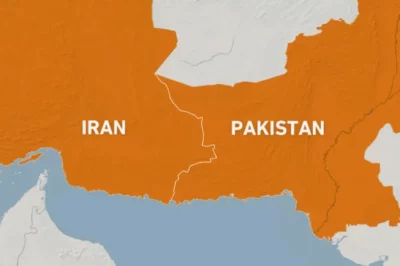As the geopolitical landscape in South Asia continues to evolve, the recent escalation in tensions between Iran and Pakistan presents a significant challenge to regional stability. The exchange of airstrikes across their shared border, sparked by insurgent activities, underscores the deep-rooted issues that plague this volatile region. It is imperative that both nations, along with the international community, engage in a concerted effort to de-escalate tensions and pave the way for lasting peace and cooperation.
The Roots of Discord
The Iran-Pakistan border has long been a flashpoint for conflict, with insurgent groups such as Jaish al-Adl and the Baloch Liberation Army (BLA) exploiting the rugged and porous terrain to launch cross-border attacks. These groups, driven by aspirations for an independent Balochistan, have added complexity to the strained relations between Tehran and Islamabad. The recent airstrikes manifest the frustration and insecurity felt by both nations as they grapple with internal and external threats to their sovereignty.
The Balochistan Conundrum
At the heart of these tensions lies the troubled region of Balochistan, spanning Iran, Pakistan, and Afghanistan. This area, rich in natural resources yet plagued by underdevelopment, has become a breeding ground for separatist sentiment. The grievances of the Baloch people, rooted in economic marginalization and political disenfranchisement, have fueled a cycle of violence and repression. Addressing these underlying issues is key to resolving the insurgent problem and bringing stability to the region.
The Danger of Escalation
The tit-for-tat airstrikes between Iran and Pakistan raise the specter of a broader conflict, with potentially devastating consequences for South Asia and beyond. The involvement of external powers, each with their vested interests in the region, could further complicate the situation. Tehran and Islamabad must recognize that military action, while offering short-term gains, ultimately exacerbates tensions and hinders the prospects for lasting peace.
Also Read: Life lessons for happiness
Solutions for Further De-escalation
A Diplomatic Imperative
The way forward lies in diplomatic engagement and confidence-building measures. Iran and Pakistan must initiate a dialogue to address their concerns and work towards enhanced border security and intelligence-sharing cooperation. This could involve joint patrols, establishing communication hotlines, and regular meetings between border officials. Such steps would not only help in curtailing insurgent activities but also build trust between the two neighbors.
Respect for Sovereignty and Territorial Integrity
Both Iran and Pakistan should reaffirm their commitment to respecting each other’s sovereignty and territorial integrity. Any concerns related to cross-border activities should be addressed through diplomatic channels and in accordance with international law.
Addressing Security Concerns
Both countries have legitimate security concerns, including border security and the threat of terrorism. Cooperation on intelligence-sharing, border management, and counter-terrorism efforts can help address these common challenges and build trust between security establishments.
Crisis Management Mechanisms
Establishing crisis management mechanisms, including hotlines and protocols for de-escalation, can help prevent minor incidents from spiraling into larger conflicts. Rapid communication channels between military and diplomatic channels are essential in this regard.
Regional Stability
Recognizing the interconnectedness of regional security, Iran and Pakistan should work together to promote stability and conflict resolution in neighboring countries such as Afghanistan. Collaborative efforts towards peacebuilding and development can contribute to a more secure and prosperous region.
The Role of the International Community
The international community, particularly regional powers and multilateral organizations, have a crucial role in facilitating dialogue and offering support for conflict resolution initiatives. Countries like China, which have significant economic interests in the region, and organizations like the Shanghai Cooperation Organization (SCO) could serve as mediators in fostering a conducive environment for negotiations.
Addressing Socio-Economic Disparities
Long-term stability in Balochistan requires a holistic approach that goes beyond military solutions. Iran and Pakistan need to invest in the region’s socio-economic development, ensuring that the Baloch people have access to education, healthcare, and employment opportunities. Empowering local communities and ensuring their participation in decision-making processes is essential for addressing the sense of alienation and injustice that fuels separatist movements.
Long-Term Vision
Finally, both countries should commit to a long-term vision of peaceful coexistence and cooperation. This requires political will, patience, and sustained efforts from both sides, as well as support from the international community.
The Way Ahead
The path to stability in the Iran-Pakistan border region is fraught with challenges but manageable. It requires a multi-faceted strategy that combines diplomatic engagement, socio-economic development, and regional cooperation. By addressing the root causes of the conflict and building a framework for peaceful coexistence, Iran and Pakistan can transform this volatile border into a beacon of stability and prosperity.
In conclusion, the recent escalation in Iran-Pakistan tensions is a stark reminder of South Asia’s fragile state of affairs. However, it also allows both nations to reassess their strategies and work collaboratively towards a peaceful and prosperous future. The international community must support these efforts, recognizing that stability in this region is crucial for global peace and security. With a concerted effort and a commitment to dialogue and development, a brighter future for the people of Balochistan and the broader region is within reach.
Author Sania Sajjad is a graduate student of International Relations at the International Islamic University, Islamabad.








